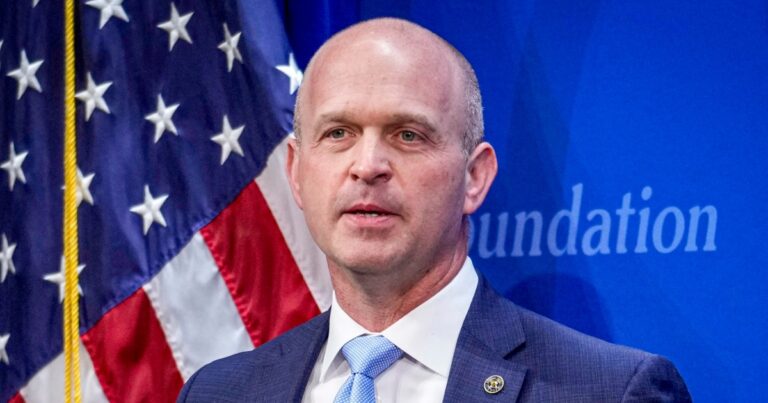Former President Donald Trump and other Republicans have been cautious when asked whether they would accept the results of this year’s presidential election. Trump has repeatedly said he would accept it “if everything is honest” — an apparent evasion of his false claims of election fraud. But now, a band of conservative nerds are already preemptively declaring that the 2024 election results will be fraudulent.
I use the word “nerd” here pejoratively, although I am one of them. It’s the only appropriate way to describe the people who gathered at the Heritage Foundation, the conservative think tank behind Project 2025, to “wargame” the upcoming election. But the so-called simulations they ran weren’t designed to help us understand the weaknesses of our election infrastructure; they were designed to lay the groundwork for justifying throwing out any results that didn’t return Trump to the White House.
The so-called simulations they ran were not designed to help understand weaknesses in election infrastructure.
“As things stand, there is zero chance of a free and fair election,” Mike Howell, executive director of the Heritage Oversight Project, told The Washington Post. “I formally charge the Biden administration with creating a situation in which most rational policymakers and officials would not be able to certify the election in good conscience.” It’s a bold statement, one not credibly backed up by the group’s own research, especially given the bias woven into its work.
Now, I should state that I am not an expert in this field. There are a lot of real war game designers out there, and I have had the privilege of interacting with some of them, including Rex Brienen, a political science professor at McGill University, and Ellie Bartels, who works at the RAND Corporation. But I did Throughout high school and after college, I attended several Model UN conferences (if anyone is checking out my nerdiness).
Heritage’s effort, called the “2024 Transition Integrity Project,” is a thinly veiled imitation of a simulation of the same name conducted by a bipartisan group of experts ahead of the 2020 election. The latter is based on a design called the “Matrix Game,” in which groups representing various stakeholders are given a starting point, and then asked to declare what they would do in response and debate why such actions would or would not work. Success is determined by the strength of supporting arguments and by dice rolls (to introduce an element of chance, as in a session of Dungeons & Dragons).
In contrast, the 2024 version had a much looser system, in which the “players” reacted to a series of “real-world” updates created by the team running the project, and then incorporated those reactions into the plot. Reading the summaries of both versions, the Heritage version had too many stakeholders, making it sound more like a silly Model UN exploit rather than a calm consideration of what’s going to happen this fall.
Besides the Biden administration and the Republican National Committee, there were conservative attendees representing China, Mexican drug cartels, and Black Lives Matter/Antifa/pro-Hamas groups. As The Washington Post pointed out in its report, the simulation included a scene in which pro-Hamas terrorists kidnapped Barbra Streisand as an event that could affect the election outcome. Now, I’m not saying that Babs being taken hostage wouldn’t be a crisis of epic proportions, but I’m just saying that it’s hard to see what useful insights about the election could be gleaned from that baseless scenario.
Moreover, Heritage’s 2024 simulation starts from the assumption that Democrats rigged the system in 2020 and works backwards from there. Because of this, Heritage administrators wrote in their report that they reached a similar conclusion to TIP’s 2020 work. “Incumbents are always the greatest threat to a peaceful and effective transition of power,” the conservative game runners wrote. This is without irony, and without any mention of Trump’s own well-documented attempts to thwart just that after the 2020 election.
Heritage’s 2024 simulation starts with the assumption that Democrats rigged the system in 2020 and works backwards from there.
This premise culminated in Biden administration surrogates painting a bizarre-world scenario as one of their final major acts in the first of two sessions in 2024. Rather than admitting slight defeat, they said:[Attorney General] Merrick Garland’s Justice Department arrested Donald Trump at Mar-a-Lago on November 7th and charged him with mishandling classified documents and insurrection for the events of January 6th, 2021. Specifically, Garland’s replacement chose to arrest Trump and indict him on treason, which feels like the furthest thing from Garland’s approach.
Heritage’s coup-hungry cosplay stands in contrast to the 2020 edition, in which both sides in the simulation tried to shake up the narrative after Election Day’s indecisive outcome. But unlike the Trump team, which the facilitator wrote was “consistently more ruthless.” [and] “There is an increasing disregard for existing democratic norms,” said the group representing Team Biden in the 2020 exercise, “and they generally feel constrained by their adherence to norms and their desire to contain violence and reduce instability.”
Like Trump himself, TIP 2024’s biggest blind spot, and defining feature, is that all involved were forced to believe that both sides were equally willing to break convention to stay in power. In doing so, the initial premise was that Biden would stage a Democratic version of the power grab that Trump attempted after his 2020 defeat. That twisted logic would then be used to justify any attempts by Trump and the RNC’s “Election Integrity Project” to delegitimize Biden’s possible victory.
That effort has already begun, with Republicans preparing to challenge Trump’s court losses in a more organized version of their 2020 legal efforts. The Heritage-backed report may well be included as evidence in some of the briefs that end up being filed. Courts faced with such a case must understand that Heritage has produced not serious academic research but a wild, highly exhibitionistic piece of fan fiction.


